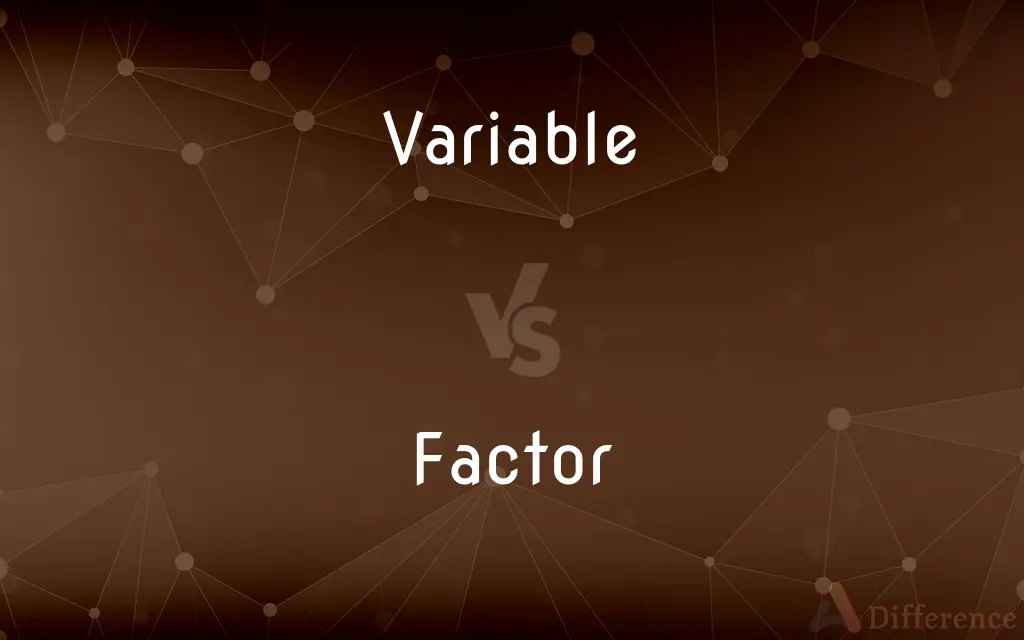Variable vs. Factor — What's the Difference?
Edited by Tayyaba Rehman — By Maham Liaqat — Updated on April 1, 2024
A variable is an element, feature, or quantity that can change or vary, often used in experiments and statistics, while a factor is a component or element that contributes to a result or outcome, used broadly in mathematics, science, and other fields.

Difference Between Variable and Factor
Table of Contents
ADVERTISEMENT
Key Differences
Variables are integral to scientific experiments, research, and statistical analysis, representing aspects that can assume different values, such as temperature, age, or income. They are categorized into different types, such as independent, dependent, and controlled variables, depending on their role in an experiment. On the other hand, factors are elements that influence results or outcomes. In mathematics, factors are numbers that divide another number exactly, but in general usage, factors refer to contributing components in various contexts, such as environmental factors affecting plant growth.
In the context of research and experiments, variables are actively manipulated or observed to understand their effects on outcomes, highlighting the cause-and-effect relationships. Factors, however, may not always be manipulated; they can be conditions or components that naturally contribute to an outcome, often identified as potential influences or risks in studies.
The identification of variables is crucial for designing experiments and conducting statistical analyses, enabling researchers to isolate and test the effects of specific changes. Factors, while also identified in research, are often components of the environment or situation being studied, recognized for their potential impact on the variables or outcomes.
While variables are specifically defined and measurable elements within a study or experiment, factors can be broader, encompassing various elements that contribute to or affect outcomes, including variables. The relationship between factors and variables can be complex, as factors can influence the selection and behavior of variables in research.
In statistical modeling, variables are used to build models that predict or explain outcomes, categorized by their roles within the model (e.g., predictor variables, outcome variables). Factors in this context might refer to the underlying conditions or elements that influence the variables’ relationships and model's accuracy.
ADVERTISEMENT
Comparison Chart
Definition
An element that can change or vary within an experiment or study.
A component or element that contributes to a result or outcome.
Role in Research
Manipulated or observed to determine effects on outcomes.
Contributing components, often not manipulated but identified as influences.
Types
Independent, dependent, controlled.
Mathematical (e.g., numbers), environmental, biological, etc.
Context of Use
Experiments, statistics, research.
Mathematics, science, research, general analysis.
Measurement
Specifically defined and measurable.
May be quantitative or qualitative, depending on context.
Compare with Definitions
Variable
A changeable aspect of a study.
In a study on plant growth, sunlight exposure was the variable.
Factor
Elements that divide another number exactly in mathematics.
In 15, the factors are 1, 3, 5, and 15.
Variable
Quantities that can assume multiple values.
The variable of interest in the survey was age.
Factor
Contributing causes in analysis.
The study identified diet as a key factor affecting health.
Variable
Elements adjusted in an experiment.
Scientists manipulated the temperature variable.
Factor
Influences on outcomes in studies.
Socioeconomic status was a factor in the research on education.
Variable
Factors in statistical models.
Income level was used as a variable in the economic model.
Factor
Components of a situation.
Weather conditions were a critical factor in the crop yield.
Variable
Categories of data in analysis.
The study analyzed the variable of dietary habits among participants.
Factor
Elements considered in decision-making.
Cost and time were factors in the project's feasibility study.
Variable
Likely to change or vary; subject to variation; changeable.
Factor
A circumstance, fact, or influence that contributes to a result
His skill was a factor in ensuring that so much was achieved
She worked fast, conscious of the time factor
Variable
Inconstant; fickle.
Factor
A number or quantity that when multiplied with another produces a given number or expression
An amount that exceeds it by a factor of 1000 or more
Variable
(Biology) Tending to exhibit genetic variation or variation in a physical trait
Geographically variable color patterns.
Factor
A level on a scale of measurement.
Variable
(Mathematics) Having no fixed quantitative value.
Factor
Any of a number of substances in the blood, mostly identified by numerals, which are involved in coagulation.
Variable
Something that varies or is prone to variation.
Factor
An agent who buys and sells goods on commission
His father was chief factor for the Hudson's Bay Company
Variable
(Astronomy) A variable star.
Factor
Another term for factorize
Last year researchers factored a number 155 digits long
Variable
A quantity capable of assuming any of a set of values.
Factor
(of a company) sell (its invoices) to a factor
They collected rents while he factored these forfeited estates
Variable
A symbol representing such a quantity. For example, in the expression a2 + b2 = c2, a,b, and c are variables.
Factor
One that actively contributes to an accomplishment, result, or process
"Surprise is the greatest factor in war" (Tom Clancy).
Variable
Able to vary or be varied.
Variable winds or seasons; a variable quantity; a variable resistor
Factor
One who acts for someone else; an agent.
Variable
Likely to vary.
Factor
One who purchases accounts receivable at a discount.
Variable
Marked by diversity or difference.
Factor
(Mathematics) One of two or more quantities that divides a given quantity without a remainder. For example, 2 and 3 are factors of 6; a and b are factors of ab.
Variable
(mathematics) Having no fixed quantitative value.
Factor
A quantity by which a stated quantity is multiplied or divided, so as to indicate an increase or decrease in a measurement
The rate increased by a factor of ten.
Variable
(biology) Tending to deviate from a normal or recognized type.
Factor
A gene. No longer in technical usage.
Variable
Something that is variable.
Factor
(Physiology) A substance that functions in a specific biochemical reaction or bodily process, such as blood coagulation.
Variable
Something whose value may be dictated or discovered.
There are several variables to consider here.
Factor
To determine or indicate explicitly the factors of
If you factor 70, you get 2, 5, and 7.
Variable
(mathematics) A symbol representing a variable.
Factor
To engage in purchasing accounts receivable at a discount.
Variable
(programming) A named memory location in which a program can store intermediate results and from which it can read them.
Factor
(obsolete) A doer, maker; a person who does things for another person or organization.
The factor of the trading post bought the furs.
Variable
(astronomy) A variable star.
Factor
An agent or representative.
Variable
(nautical) A shifting wind, or one that varies in force.
Factor
(legal)
Variable
Those parts of the sea where a steady wind is not expected, especially the parts between the trade-wind belts.
Factor
A commission agent.
Variable
Having the capacity of varying or changing; capable of alternation in any manner; changeable; as, variable winds or seasons; a variable quantity.
Factor
A person or business organization that provides money for another's new business venture; one who finances another's business.
Variable
Liable to vary; too susceptible of change; mutable; fickle; unsteady; inconstant; as, the affections of men are variable; passions are variable.
Lest that thy love prove likewise variable.
His heart, I know, how variable and vain!
Factor
A business organization that lends money on accounts receivable or buys and collects accounts receivable.
Variable
That which is variable; that which varies, or is subject to change.
Factor
One of the elements, circumstances, or influences which contribute to produce a result.
The greatest factor in the decision was the need for public transportation.
The economy was a factor in this year's budget figures.
Variable
A quantity which may increase or decrease; a quantity which admits of an infinite number of values in the same expression; a variable quantity; as, in the equation x2 - y2 = R2, x and y are variables.
Factor
(mathematics) Any of various objects multiplied together to form some whole.
3 is a factor of 12, as are 2, 4 and 6.
The factors of the Klein four-group are both cyclic of order 2.
Variable
A shifting wind, or one that varies in force.
Factor
(causal analysis) Influence; a phenomenon that affects the nature, the magnitude, and/or the timing of a consequence.
The launch temperature was a factor of the Challenger disaster.
Variable
Something that is likely to vary; something that is subject to variation;
The weather is one variable to be considered
Factor
(economics) A resource used in the production of goods or services, a factor of production.
Variable
A quantity that can assume any of a set of values
Factor
(Scotland) A steward or bailiff of an estate.
Variable
A star that varies noticeably in brightness
Factor
(transitive) To find all the factors of (a number or other mathematical object) (the objects that divide it evenly).
Variable
A symbol (like x or y) that is used in mathematical or logical expressions to represent a variable quantity
Factor
To be a product of other objects.
Variable
Liable to or capable of change;
Rainfall in the tropics is notoriously variable
Variable winds
Variable expenses
Factor
To sell a debt or debts to an agent (the factor) to collect.
Variable
Marked by diversity or difference;
The varying angles of roof slope
Nature is infinitely variable
Factor
One who transacts business for another; an agent; a substitute; especially, a mercantile agent who buys and sells goods and transacts business for others in commission; a commission merchant or consignee. He may be a home factor or a foreign factor. He may buy and sell in his own name, and he is intrusted with the possession and control of the goods; and in these respects he differs from a broker.
My factor sends me word, a merchant's fledThat owes me for a hundred tun of wine.
Variable
(used of a device) designed so that a property (as e.g. light) can be varied;
A variable capacitor
Variable filters in front of the mercury xenon lights
Factor
A steward or bailiff of an estate.
Factor
One of the elements or quantities which, when multiplied together, form a product.
Factor
One of the elements, circumstances, or influences which contribute to produce a result; a constituent; a contributory cause.
The materal and dynamical factors of nutrition.
Factor
To resolve (a quantity) into its factors.
Factor
Anything that contributes causally to a result;
A number of factors determined the outcome
Factor
An abstract part of something;
Jealousy was a component of his character
Two constituents of a musical composition are melody and harmony
The grammatical elements of a sentence
A key factor in her success
Humor: an effective ingredient of a speech
Factor
Any of the numbers (or symbols) that form a product when multiplied together
Factor
One of two or more integers that can be exactly divided into another integer;
What are the 4 factors of 6?
Factor
A businessman who buys or sells for another in exchange for a commission
Factor
An independent variable in statistics
Factor
(genetics) a segment of DNA that is involved in producing a polypeptide chain; it can include regions preceding and following the coding DNA as well as introns between the exons; it is considered a unit of heredity;
Genes were formerly called factors
Factor
Resolve into factors;
A quantum computer can factor the number 15
Common Curiosities
Can a factor become a variable?
Yes, a factor can become a variable if it is defined as such in an experimental setup or analysis, allowing it to be measured or manipulated.
What is the difference between a variable and a factor in research?
Variables are elements that can vary and are often manipulated in research to observe effects on outcomes, while factors are contributing elements or conditions that influence results.
Why are factors important in mathematical problems?
Factors are important in mathematics for simplifying equations, solving problems, and understanding the properties of numbers.
Are all factors in a study measurable?
Not all factors are directly measurable, especially in qualitative research, but they can be observed and analyzed for their influence on outcomes.
How do variables affect the outcomes of experiments?
Variables affect outcomes by being manipulated (independent variables) or measured (dependent variables) to study the cause-and-effect relationships in experiments.
How do researchers decide which variables to study?
Researchers decide based on the research question, hypothesis, and theoretical framework, aiming to isolate factors that can provide meaningful insights into cause-and-effect relationships.
What makes a variable independent or dependent?
An independent variable is manipulated to observe its effect on the dependent variable, which is the outcome of interest.
What role do variables play in statistical modeling?
Variables are used in statistical models to predict outcomes, understand relationships, and explain variations in data.
How can understanding factors improve decision-making?
Understanding factors that influence a situation can help in making informed decisions by considering all potential impacts and outcomes.
Can environmental conditions be considered variables?
Yes, environmental conditions can be considered variables if they are specifically measured or manipulated as part of a study’s design.
Share Your Discovery

Previous Comparison
Refresh vs. Fresh
Next Comparison
Snack vs. RefreshmentAuthor Spotlight
Written by
Maham LiaqatEdited by
Tayyaba RehmanTayyaba Rehman is a distinguished writer, currently serving as a primary contributor to askdifference.com. As a researcher in semantics and etymology, Tayyaba's passion for the complexity of languages and their distinctions has found a perfect home on the platform. Tayyaba delves into the intricacies of language, distinguishing between commonly confused words and phrases, thereby providing clarity for readers worldwide.














































